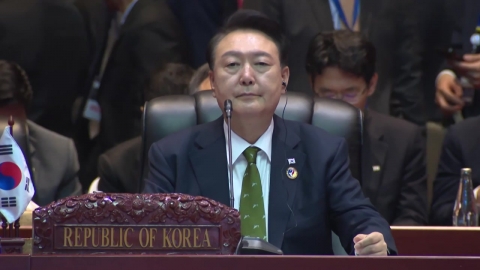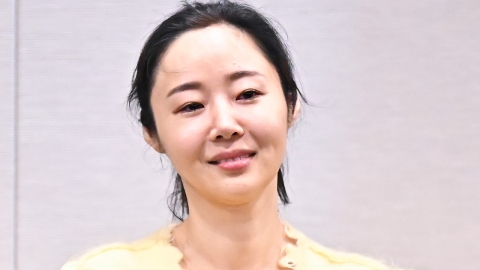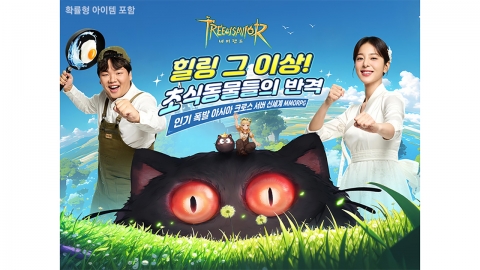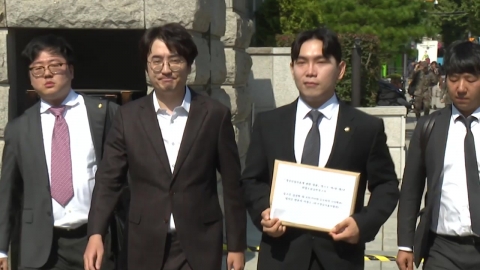[News Now] Han River Wins Nobel Prize for Literature...Korean literature 'New History'
■ Host: Kim Sun-young Anchor
■ Starring: Kim Heon-sik, cultural critic
* The text below may differ from the actual broadcast content, so please check the broadcast for more accurate information. Please specify [YTN NewsNOW] when quoting.
[Anchor]
Han Kang, you are the first Korean and the first Asian woman to win the Nobel Prize in Literature. Let's talk with cultural critic Kim Heon-sik. Welcome.
[Kim Heon-sik]
How are you?
[Anchor]
No one expected it and he said he was surprised.
[Kim Heon-sik]
Everyone was surprised. If you look at the reason, first of all, it's because she's a female writer. This is because only 17 female writers have won awards overall. Also, it's hard for a non-white writer to win the award. So from 2000 to 2023, there are only seven non-white writers. That's why an Asian artist won the award in 12 years after Mowen. What's important is that even if it's mentioned in my opinion, even if you're in the candidate group, it's basic to fail even if you're in the 3rd, 4th, or 5th positions. For example, Goeun and Hwang Seokyoung were mentioned a lot.Ma did not win the award, and in that sense, he was not mentioned in the Nobel Prize in earnest, so he didn't think he would win the award.
[Anchor]
Usually, there are some media cameras before the Nobel Prize is announced, and people gather with their families to wait for the presentation, but Han Kang says he is not like that at all, but he was surprised in his daily life. Wasn't he a strong candidate? How do I look at it?
[Kim Heon-sik]
That's right. So in the case of Han Kang writer, it was the same day as any other day. So I answered the phone while I was reading, taking a walk, and having dinner. That's what I'm saying. In particular, the Nobel Prize for Literature is often posted on betting sites. It was a situation where it was not mentioned at all. Therefore, not only Korea but also foreign media around the world said they were very surprised because it was such an award that appeared like a dark horse, but it was only a little early.
[Anchor]
He said he heard the news after eating with his son. Let's listen to the interview right after Han Kang won the award.
[Han Kang / Novelist (Winning Nobel Prize for Literature): It was about 8 p.m. after I had just finished eating with my son, and it was a peaceful evening. I was really surprised. I grew up reading books in Korean as well as translations since I was young. I can say that I grew up with Korean literature, which I feel very close to. I hope this news will also be good for Korean literature readers and friends writers. Writers find meaning in their lives, sometimes lost and sometimes determined. All their hard work and strength were my inspiration. ]
[Anchor]
When I asked about the celebration plan in the interview, I will drink tea with my son. I heard that Han Kang talked calmly like this. What is the standard for deciding the winner of the Nobel Prize in Literature?
[Kim Heon-sik]
There are two points. The first is the universal themes of humanity, such as war, peace, and violence. On top of that, I also think about race and sex issues. There should be some specificity here. For example, there must be differentiation through historical and cultural materials in Korea, and it is most important to reflect both aspects evenly at the point where individuals and society meet. In particular, in the case of writer Han Kang, I have recently received a lot of questions about the need for a change in the Nobel Prize in Literature because it is far from the existing novel grammar and has a new perspective. From that point of view, I think Han Kang's works and activities were judged to be appropriate.
[Anchor]
The chairman of the Nobel Committee said this. It is an intense poetic prose of the artist who faces the wounds of history and reveals the vulnerability of human life as it is. The world of Han Kang's work, what part of it can be considered to be the highest?
[Kim Heon-sik]
First of all, what the Nobel Committee highlighted was historical trauma. What is this historical trauma? For example, if you live in a modern society, there are many events, right? Those events don't stay in the past, they constantly affect people in the present and in the future. When a wound heals, it causes pain, which is why it is the shape of human life that continues to influence unless it is resolved. That's why we need to prevent this violence and war from happening. It seems to have been highly praised by the Nobel Committee for expressing in poetic prose that a solution is needed to heal the wound.
[Anchor]
When you select the Nobel Prize for Literature, you don't pick a special work and you evaluate the whole world of the artist's work, right?
[Kim Heon-sik]
That's right. So if we win the award this time, we have to see what kind of difference Han Kang has. As I said earlier, there should be a difference in Korea's historical aspects. Also, Han Kang's special perspective and attempt will be important. First of all, didn't our country go through the process of democratization after escaping from division, war, and dictatorship? In the process, Han Kang has been writing her work from a feminist perspective. In general, there have been quite a few male-centered views in Korean literature regarding division, war, and dictatorship. And specifically, the process of the April 3 Uprising and the democratization movement, especially the May 18 Democratic Movement, is how we should look at it from a feminist perspective.
Also, as I mentioned earlier, when I write a novel, it is written in a poetic language, so it is a little different and differentiated in that respect. So, the characteristics of those who try and fail because Han Kang's work is famous can be a little difficult because those who are used to following the story line and reading it write it in the form of poetic verse. However, I can summarize that it showed a different world of works that require a little time to enter the literary world when you get used to the unique delicate psychological descriptions, styles, and handwriting.
[Anchor]
In particular, what is human existence that feels profound, what it means to live, and what it means to be violent. It's characteristic of digging deep into these areas.
[Kim Heon-sik]
Humanities and art are the starting point for humans. It's essentially exploring what human beings are. However, author Han Kang sees two points as opposing points, and humans are basically violent. And there are people who are hurting and suffering because of the violence. The extreme form of violence is war, slaughter, and so on. That's why it's showing through humanistic thinking that those things can always happen and how do we respond to them when they happen? So when exploring the essential parts of human beings, alternatives can also come out. So dichotomously, for example, if you think that there is someone else who causes war and violence, and if you think that it is separate from us, there will be no solution. It will be meaningful in that it is digging into those parts.
[Anchor]
In an interview with the Nobel Committee immediately after winning the award, he recommended this work, saying that he does not say goodbye. Writer Han Kang. What kind of work is this?
[Kim Heon-sik]
It can be seen as a recent work that doesn't say goodbye. So the meaning of not saying goodbye here is important, but it's not that I won't say goodbye. Something like not saying goodbye is a will of one's own. But not saying goodbye is the truth. What this means is that there is an issue that caused the wounds and pain of modern Korean history. It's going to be the 4.3. Therefore, the painful history of the April 3 Uprising and the story of three women who share their memories are telling, so in the end, he said that he will not forget the hurt and pain caused by the April 3 Uprising. In a way, the attempts of literary works that Han Kang has been exploring are condensed. You can look backwards like this.
[Anchor]
I wondered where this genius came from, and my father is also a novelist.
[Kim Heon-sik]
Artist Han Seung-won is the one who wrote such widely known works such as Azease Barase. The family itself is a literary family. Because my husband and younger brother are both writing in the literary field.
[Anchor]
Han Kang is also an outstanding writer.
[Kim Heon-sik]
That's why people often say that it's a family tradition. Genetic DNA is important, but I think that might have had an effect because my family was immersed in literature since I was young. So don't we use such words a lot in our country? It's called Cheongchul Eoram. Writer Han Seung-won is a father, but he often gets jealous because he writes much better sentences than himself. That's how I said it. So I think Han Seung-won's attitude is also great. Because it is easy to say that this is how a novel should be written in the past, but because he was open, I think those attitudes have achieved results and results when Han Kang released free works and experimental works.
[Anchor]
I think he's the kind of father who respects his daughter's free world of work rather than forcing her philosophy of his work. Let's hear for a moment how the father evaluated his daughter's work.
[Han Seung-won / 'Nobel Literature Award' Han Kang Father: My daughter's sentences are very delicate, beautiful and sad. The literary attitude of the 4th generation literature that Kang is likely to belong to is whether it was influenced by fantastic realism, whether it has that kind of mythical taste, and once there was a mythical, fantastical realism element in my novel. The author Kang wrote literature more beautifully with mythical elements and fantastic realism elements. ]
[Anchor]
Delicate and beautiful, but sad. You evaluated it like this.
[Kim Heon-sik]
So Han Kang mainly talks about the sadness of being. That's why a lot of those parts appear in poetry. For example, there's this expression in poetry. My body is old and will be scattered now. But when one snow flower falls in front of me, I can see it glistening. Essentially, our existence is extinguished. But now, for example, I don't have to despair or be depressed about it, and I can do my best or enjoy the parts I can do now. Basically, I'm not saying that the world is beautiful, but that there is pain, despair, and depression, but I still have the power to endure and live there, so I think writer Han Seung-won expressed that.
[Anchor]
According to an interview with Han Kang's father, Han Kang expressed his position that he would not hold an award press conference in consideration of the world war situation.
[Kim Heon-sik]
The reason why the artist Han Kang is highly regarded is that he is practicing the part of his words and actions or the world of his work. Actually, what surprised me this time is that I don't usually show myself. But I don't know if it's because it's a Nobel Prize committee, but I was surprised to do a YouTube interview right away. It's also impressive that he doesn't usually show himself, and most of all, in the world of his work, he embodies a lot of resistance to violence and counterattack. But the war in Ukraine and the war in Israel is at the peak of violence. Since the peak is war, both sides say they are right because of the war, but many people are killed and injured anyway. As a result, wounds and trauma continue to emerge. Therefore, it is in the context of saying that it is not appropriate to hold a press conference in this situation. In a way, it can be seen as a real writer and an intellectual.
[Anchor]
How to translate such delicate and deep sentences so that they can reach people all over the world, this part must have been quite a difficult task. Finding the right person would have been an important key to this award.
[Kim Heon-sik]
That's right. In fact, it is a common story around the world that the level of literary works in Korea does not fall that much. Not only Korea is talking about the fact that Korea's literary character does not decline, but Japanese literature also acknowledges that a lot. However, the 1-inch barrier that director Bong Joon-ho mentioned. There was a problem with translation. So, in the case of Deborah Smith, the translation was smoothly reflected so that British and American readers could understand the quality of the original work better because he majored in Korean, Korean studies, and Korean literature in Korea. In that sense, if Korean literature and excellent works are translated together with local people, Nobel laureates can continue to appear in the future. So let's say that we've confirmed this time that the power of translation, that step, is already out of the way.
[Anchor]
Novelist Han Kang said this when he won the Man Booker Prize. Let's hear how you felt at that time.
[Han Kang / Novelist (2016, when Man Booker won): I was happy to work with Mr. Deborah. Congratulations Deborah. I'm lucky to have met Deborah, a translator and friend of mine who translated my book brilliantly. When I wrote "The Vegetarian," I wanted to ask what human beings are. I wanted to paint a woman who desperately refused to belong to the race of humanity. I wanted to paint a woman who refused to be a violent human being. ]
[Anchor]
I heard how you felt when you won the Man Booker Award for being a vegetarian. I'm talking to the translator Deborah, but will that be a joint award?
[Kim Heon-sik]
In fact, the Man Booker Prize highly appreciates the importance of translation. That's why we have no choice but to use the expression co-award at that time because it gives awards not only to the author who wrote the original but also to the translator who translated it. So I can see how important translation is through this award system, and that's how it started, and I think that I won the Nobel Prize for Literature.
[Anchor]
It is also famous for reviving the taste of Korean.
[Kim Heon-sik]
That's right. So actually Deborah Smith has been studying Korean by herself since 2016 and came to Korea to do a master's and doctorate in Korean studies. But when we say translation, we don't just express sentences, do we? For example, Korean life, culture, and history must be understood in order to properly translate expressions for sentences. So what we should think about while looking at Deborah Smith is that it is very important to cultivate such translators who go together through solidarity and communication rather than going from the periphery to the mainstream culture on our own. So, in the case of the Korea Translation Institute, we are paying a lot of attention to this, so we are looking forward to more results in the future.
[Anchor]
Han Kang calmly accepted that he wanted to celebrate by drinking tea in his daily life, but the Nobel Prize in Literature will leave a significant mark on the Korean literature community, so what meaning will this remain? Lastly, please explain this as well.
[Kim Heon-sik]
First of all, I think I opened the door. So, you've been talking about Samsu, Gunner, and Osu, but it's very difficult to cross the threshold because it's crossed that threshold, but especially in Anglo-American and European countries, we don't allow it because we're unfamiliar at first, but once we step in, it's a basic framework to expand our doors. So I think there will probably be a lot of future follow-up writers. Right now, a lot of people talk about book-related sales in Korea. I was going to buy it, but I can't buy it, I can't even rent it. You're talking about this. In fact, famous overseas publishers are very interested in Korean literature. So, after winning the Nobel Prize for Literature, I think that many works by Korean novelists will be sold in addition to those by Han Kang. On the one hand, not only literature, but also overall, the position and status of K contents are rising, so I think that the level of our culture and art and global interest will rise together and create a synergy effect.
[Anchor]
Haruki Murakami won the Nobel Prize for Literature, which he really wanted to receive but hasn't received yet. I think it will be a great milestone for future literary people. This has been Kim Heon-sik, a cultural critic. Thank you.
[Kim Heon-sik]
Thank you.
※ 'Your report becomes news'
[Kakao Talk] YTN Search and Add Channel
[Phone] 02-398-8585
[Mail] social@ytn. co. kr
■ Starring: Kim Heon-sik, cultural critic
[Anchor]
Han Kang, you are the first Korean and the first Asian woman to win the Nobel Prize in Literature. Let's talk with cultural critic Kim Heon-sik. Welcome.
[Kim Heon-sik]
How are you?
[Anchor]
No one expected it and he said he was surprised.
[Kim Heon-sik]
Everyone was surprised. If you look at the reason, first of all, it's because she's a female writer. This is because only 17 female writers have won awards overall. Also, it's hard for a non-white writer to win the award. So from 2000 to 2023, there are only seven non-white writers. That's why an Asian artist won the award in 12 years after Mowen. What's important is that even if it's mentioned in my opinion, even if you're in the candidate group, it's basic to fail even if you're in the 3rd, 4th, or 5th positions. For example, Goeun and Hwang Seokyoung were mentioned a lot.Ma did not win the award, and in that sense, he was not mentioned in the Nobel Prize in earnest, so he didn't think he would win the award.
[Anchor]
Usually, there are some media cameras before the Nobel Prize is announced, and people gather with their families to wait for the presentation, but Han Kang says he is not like that at all, but he was surprised in his daily life. Wasn't he a strong candidate? How do I look at it?
[Kim Heon-sik]
That's right. So in the case of Han Kang writer, it was the same day as any other day. So I answered the phone while I was reading, taking a walk, and having dinner. That's what I'm saying. In particular, the Nobel Prize for Literature is often posted on betting sites. It was a situation where it was not mentioned at all. Therefore, not only Korea but also foreign media around the world said they were very surprised because it was such an award that appeared like a dark horse, but it was only a little early.
[Anchor]
He said he heard the news after eating with his son. Let's listen to the interview right after Han Kang won the award.
[Han Kang / Novelist (Winning Nobel Prize for Literature): It was about 8 p.m. after I had just finished eating with my son, and it was a peaceful evening. I was really surprised. I grew up reading books in Korean as well as translations since I was young. I can say that I grew up with Korean literature, which I feel very close to. I hope this news will also be good for Korean literature readers and friends writers. Writers find meaning in their lives, sometimes lost and sometimes determined. All their hard work and strength were my inspiration. ]
[Anchor]
When I asked about the celebration plan in the interview, I will drink tea with my son. I heard that Han Kang talked calmly like this. What is the standard for deciding the winner of the Nobel Prize in Literature?
[Kim Heon-sik]
There are two points. The first is the universal themes of humanity, such as war, peace, and violence. On top of that, I also think about race and sex issues. There should be some specificity here. For example, there must be differentiation through historical and cultural materials in Korea, and it is most important to reflect both aspects evenly at the point where individuals and society meet. In particular, in the case of writer Han Kang, I have recently received a lot of questions about the need for a change in the Nobel Prize in Literature because it is far from the existing novel grammar and has a new perspective. From that point of view, I think Han Kang's works and activities were judged to be appropriate.
[Anchor]
The chairman of the Nobel Committee said this. It is an intense poetic prose of the artist who faces the wounds of history and reveals the vulnerability of human life as it is. The world of Han Kang's work, what part of it can be considered to be the highest?
[Kim Heon-sik]
First of all, what the Nobel Committee highlighted was historical trauma. What is this historical trauma? For example, if you live in a modern society, there are many events, right? Those events don't stay in the past, they constantly affect people in the present and in the future. When a wound heals, it causes pain, which is why it is the shape of human life that continues to influence unless it is resolved. That's why we need to prevent this violence and war from happening. It seems to have been highly praised by the Nobel Committee for expressing in poetic prose that a solution is needed to heal the wound.
[Anchor]
When you select the Nobel Prize for Literature, you don't pick a special work and you evaluate the whole world of the artist's work, right?
[Kim Heon-sik]
That's right. So if we win the award this time, we have to see what kind of difference Han Kang has. As I said earlier, there should be a difference in Korea's historical aspects. Also, Han Kang's special perspective and attempt will be important. First of all, didn't our country go through the process of democratization after escaping from division, war, and dictatorship? In the process, Han Kang has been writing her work from a feminist perspective. In general, there have been quite a few male-centered views in Korean literature regarding division, war, and dictatorship. And specifically, the process of the April 3 Uprising and the democratization movement, especially the May 18 Democratic Movement, is how we should look at it from a feminist perspective.
Also, as I mentioned earlier, when I write a novel, it is written in a poetic language, so it is a little different and differentiated in that respect. So, the characteristics of those who try and fail because Han Kang's work is famous can be a little difficult because those who are used to following the story line and reading it write it in the form of poetic verse. However, I can summarize that it showed a different world of works that require a little time to enter the literary world when you get used to the unique delicate psychological descriptions, styles, and handwriting.
[Anchor]
In particular, what is human existence that feels profound, what it means to live, and what it means to be violent. It's characteristic of digging deep into these areas.
[Kim Heon-sik]
Humanities and art are the starting point for humans. It's essentially exploring what human beings are. However, author Han Kang sees two points as opposing points, and humans are basically violent. And there are people who are hurting and suffering because of the violence. The extreme form of violence is war, slaughter, and so on. That's why it's showing through humanistic thinking that those things can always happen and how do we respond to them when they happen? So when exploring the essential parts of human beings, alternatives can also come out. So dichotomously, for example, if you think that there is someone else who causes war and violence, and if you think that it is separate from us, there will be no solution. It will be meaningful in that it is digging into those parts.
[Anchor]
In an interview with the Nobel Committee immediately after winning the award, he recommended this work, saying that he does not say goodbye. Writer Han Kang. What kind of work is this?
[Kim Heon-sik]
It can be seen as a recent work that doesn't say goodbye. So the meaning of not saying goodbye here is important, but it's not that I won't say goodbye. Something like not saying goodbye is a will of one's own. But not saying goodbye is the truth. What this means is that there is an issue that caused the wounds and pain of modern Korean history. It's going to be the 4.3. Therefore, the painful history of the April 3 Uprising and the story of three women who share their memories are telling, so in the end, he said that he will not forget the hurt and pain caused by the April 3 Uprising. In a way, the attempts of literary works that Han Kang has been exploring are condensed. You can look backwards like this.
[Anchor]
I wondered where this genius came from, and my father is also a novelist.
[Kim Heon-sik]
Artist Han Seung-won is the one who wrote such widely known works such as Azease Barase. The family itself is a literary family. Because my husband and younger brother are both writing in the literary field.
[Anchor]
Han Kang is also an outstanding writer.
[Kim Heon-sik]
That's why people often say that it's a family tradition. Genetic DNA is important, but I think that might have had an effect because my family was immersed in literature since I was young. So don't we use such words a lot in our country? It's called Cheongchul Eoram. Writer Han Seung-won is a father, but he often gets jealous because he writes much better sentences than himself. That's how I said it. So I think Han Seung-won's attitude is also great. Because it is easy to say that this is how a novel should be written in the past, but because he was open, I think those attitudes have achieved results and results when Han Kang released free works and experimental works.
[Anchor]
I think he's the kind of father who respects his daughter's free world of work rather than forcing her philosophy of his work. Let's hear for a moment how the father evaluated his daughter's work.
[Han Seung-won / 'Nobel Literature Award' Han Kang Father: My daughter's sentences are very delicate, beautiful and sad. The literary attitude of the 4th generation literature that Kang is likely to belong to is whether it was influenced by fantastic realism, whether it has that kind of mythical taste, and once there was a mythical, fantastical realism element in my novel. The author Kang wrote literature more beautifully with mythical elements and fantastic realism elements. ]
[Anchor]
Delicate and beautiful, but sad. You evaluated it like this.
[Kim Heon-sik]
So Han Kang mainly talks about the sadness of being. That's why a lot of those parts appear in poetry. For example, there's this expression in poetry. My body is old and will be scattered now. But when one snow flower falls in front of me, I can see it glistening. Essentially, our existence is extinguished. But now, for example, I don't have to despair or be depressed about it, and I can do my best or enjoy the parts I can do now. Basically, I'm not saying that the world is beautiful, but that there is pain, despair, and depression, but I still have the power to endure and live there, so I think writer Han Seung-won expressed that.
[Anchor]
According to an interview with Han Kang's father, Han Kang expressed his position that he would not hold an award press conference in consideration of the world war situation.
[Kim Heon-sik]
The reason why the artist Han Kang is highly regarded is that he is practicing the part of his words and actions or the world of his work. Actually, what surprised me this time is that I don't usually show myself. But I don't know if it's because it's a Nobel Prize committee, but I was surprised to do a YouTube interview right away. It's also impressive that he doesn't usually show himself, and most of all, in the world of his work, he embodies a lot of resistance to violence and counterattack. But the war in Ukraine and the war in Israel is at the peak of violence. Since the peak is war, both sides say they are right because of the war, but many people are killed and injured anyway. As a result, wounds and trauma continue to emerge. Therefore, it is in the context of saying that it is not appropriate to hold a press conference in this situation. In a way, it can be seen as a real writer and an intellectual.
[Anchor]
How to translate such delicate and deep sentences so that they can reach people all over the world, this part must have been quite a difficult task. Finding the right person would have been an important key to this award.
[Kim Heon-sik]
That's right. In fact, it is a common story around the world that the level of literary works in Korea does not fall that much. Not only Korea is talking about the fact that Korea's literary character does not decline, but Japanese literature also acknowledges that a lot. However, the 1-inch barrier that director Bong Joon-ho mentioned. There was a problem with translation. So, in the case of Deborah Smith, the translation was smoothly reflected so that British and American readers could understand the quality of the original work better because he majored in Korean, Korean studies, and Korean literature in Korea. In that sense, if Korean literature and excellent works are translated together with local people, Nobel laureates can continue to appear in the future. So let's say that we've confirmed this time that the power of translation, that step, is already out of the way.
[Anchor]
Novelist Han Kang said this when he won the Man Booker Prize. Let's hear how you felt at that time.
[Han Kang / Novelist (2016, when Man Booker won): I was happy to work with Mr. Deborah. Congratulations Deborah. I'm lucky to have met Deborah, a translator and friend of mine who translated my book brilliantly. When I wrote "The Vegetarian," I wanted to ask what human beings are. I wanted to paint a woman who desperately refused to belong to the race of humanity. I wanted to paint a woman who refused to be a violent human being. ]
[Anchor]
I heard how you felt when you won the Man Booker Award for being a vegetarian. I'm talking to the translator Deborah, but will that be a joint award?
[Kim Heon-sik]
In fact, the Man Booker Prize highly appreciates the importance of translation. That's why we have no choice but to use the expression co-award at that time because it gives awards not only to the author who wrote the original but also to the translator who translated it. So I can see how important translation is through this award system, and that's how it started, and I think that I won the Nobel Prize for Literature.
[Anchor]
It is also famous for reviving the taste of Korean.
[Kim Heon-sik]
That's right. So actually Deborah Smith has been studying Korean by herself since 2016 and came to Korea to do a master's and doctorate in Korean studies. But when we say translation, we don't just express sentences, do we? For example, Korean life, culture, and history must be understood in order to properly translate expressions for sentences. So what we should think about while looking at Deborah Smith is that it is very important to cultivate such translators who go together through solidarity and communication rather than going from the periphery to the mainstream culture on our own. So, in the case of the Korea Translation Institute, we are paying a lot of attention to this, so we are looking forward to more results in the future.
[Anchor]
Han Kang calmly accepted that he wanted to celebrate by drinking tea in his daily life, but the Nobel Prize in Literature will leave a significant mark on the Korean literature community, so what meaning will this remain? Lastly, please explain this as well.
[Kim Heon-sik]
First of all, I think I opened the door. So, you've been talking about Samsu, Gunner, and Osu, but it's very difficult to cross the threshold because it's crossed that threshold, but especially in Anglo-American and European countries, we don't allow it because we're unfamiliar at first, but once we step in, it's a basic framework to expand our doors. So I think there will probably be a lot of future follow-up writers. Right now, a lot of people talk about book-related sales in Korea. I was going to buy it, but I can't buy it, I can't even rent it. You're talking about this. In fact, famous overseas publishers are very interested in Korean literature. So, after winning the Nobel Prize for Literature, I think that many works by Korean novelists will be sold in addition to those by Han Kang. On the one hand, not only literature, but also overall, the position and status of K contents are rising, so I think that the level of our culture and art and global interest will rise together and create a synergy effect.
[Anchor]
Haruki Murakami won the Nobel Prize for Literature, which he really wanted to receive but hasn't received yet. I think it will be a great milestone for future literary people. This has been Kim Heon-sik, a cultural critic. Thank you.
[Kim Heon-sik]
Thank you.
[Kakao Talk] YTN Search and Add Channel
[Phone] 02-398-8585
[Mail] social@ytn. co. kr
[Copyright holder (c) YTN Unauthorized reproduction, redistribution and use of AI data prohibited]
Editor's Recomended News
AD
The Lastest News
-
재생
 Yoon "Responses International Community Unity to Russia-North Korea Illegal Military Cooperation"
Yoon "Responses International Community Unity to Russia-North Korea Illegal Military Cooperation" -
재생
![Han Kang's only novel that no one can read, "Only after I die..." [Now News]](https://image.ytn.co.kr/general/jpg/2024/1011/202410111508480261_h.jpg) Han Kang's only novel that no one can read, "Only after I die..." [Now News]
Han Kang's only novel that no one can read, "Only after I die..." [Now News] -
재생
 The first trial of the driver of the accident at City Hall Station...Let's continue with the argument for sudden acceleration.
The first trial of the driver of the accident at City Hall Station...Let's continue with the argument for sudden acceleration. -
Drunk driving in the parking lot behind the chauffeur...30 cars damaged.








![[After playing the game] Between](https://image.ytn.co.kr/general/jpg/2024/1011/202410111054554736_h.jpg)

